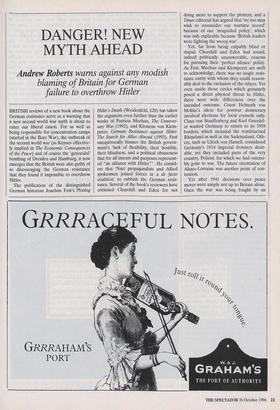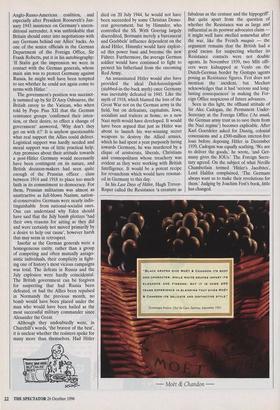DANGER! NEW MYTH AHEAD
Andrew Roberts warns against any modish blaming of Britain for German failure to overthrow Hitler BRITISH reviews of a new book about the German resistance serve as a warning that a new second world war myth is about to enter our liberal canon. For as well as being responsible for concentration camps (started in the Boer War), the outbreak of the second world war (as Keynes effective- ly implied in The Economic Consequences of the Peace) and of course the 'genocidal' bombing of Dresden and Hamburg, it now emerges that the British were also guilty of so discouraging the German resistance that they found it impossible to overthrow Hitler.
The publication of the distinguished German historian Joachim Fest's Plotting Hitler's Death (Weidenfeld, £20) has taken the argument even further than the earlier works of Patricia Meehan, The Unneces- sary War (1992), and Klemens von Klem- perer, German Resistance against Hitler: The Search for Allies Abroad (1993). Fest unequivocally blames the British govern- ment's 'lack of flexibility, their hostility, their blindness, and a political obtuseness that for all intents and purposes represent- ed "an alliance with Hitler"' . He consid- ers that 'Nazi propagandists and Allied spokesmen joined forces in a de facto coalition' to rubbish the German resis- tance. Several of the book's reviewers have criticised Churchill and Eden for not doing more to support the plotters, and a Times editorial has argued that 'we too may wish to reconsider our wartime record' because of our 'misguided policy', which was only explicable because 'British leaders were fighting the wrong war'.
Yet, far from being culpably blind or stupid, Churchill and Eden had sound, indeed politically unanswerable, reasons for pursuing their 'perfect silence' policy. As Fest, Meehan and Klemperer are swift to acknowledge, there was no single resis- tance entity with whom they could reason- ably deal to the exclusion of the others. Yet even inside those circles which genuinely posed a direct physical threat to Hitler, there were wide differences over the intended outcome. Count Helmuth von Moltke's ideas for postwar democracy involved elections for local councils only. Claus von Stauffenberg and Karl Goerdel- er wanted Germany to return to its 1939 borders, which included the remilitarised Rhineland as well as the Sudetenland. Oth- ers, such as Ulrich von Hassell, considered Germany's 1914 imperial frontiers desir- able, yet they included parts of the very country, Poland, for which we had ostensi- bly gone to war. The future orientation of Alsace-Lorraine was another point of con- tention.
Yet after 1941 decisions over peace moves were simply not up to Britain alone. Once the war was being fought by an Anglo-Russo-American coalition, and especially after President Roosevelt's Jan- uary 1943 insistence on Germany's uncon- ditional surrender, it was unthinkable that Britain should enter into negotiations with any Germans behind our Allies' backs. As one of the senior officials in the German Department of the Foreign Office, Sir Frank Roberts, put it in his autobiography: `If Stalin got the impression we were in contact with the German generals, whose main aim was to protect Germany against Russia, he might well have been tempted to see whether he could not again come to terms with Hitler.'
The government's position was succinct- ly summed up by Sir D'Arcy Osbourne, the British envoy to the Vatican, who when told by Pope Pius XII that the German resistance groups 'confirmed their inten- tion, or their desire, to effect a change of government' answered, 'Why don't they get on with it?' It is anyhow questionable what real support the Allies could deliver. Logistical support was hardly needed and moral support was of little practical help. Any promises about their attitude towards a post-Hitler Germany would necessarily have been contingent on its nature, and British decision-makers had seen quite enough of the Prussian officer class between 1914 and 1918 to place too much faith in its commitment to democracy. For them, Prussian militarism was almost as unattractive as full-blown Nazism; nation- al-conservative Germans were nearly indis- tinguishable from national-socialist ones. One can understand why Eden should have said that the July bomb plotters 'had their own reasons for acting as they did and were certainly not moved primarily by a desire to help our cause', however harsh that may seem in retrospect.
Insofar as the German generals were a homogeneous entity, rather than a group of competing and often mutually antago- nistic individuals, their complicity in fight- ing one of history's most vicious campaigns was total. The defeats in Russia and the July explosion were hardly coincidental. The British government can be forgiven for suspecting that had Russia been defeated, or had the Allies been repulsed in Normandy the previous month, no bomb would have been placed under the man who would have been hailed as the most successful military commander since Alexander the Great.
Although they undoubtedly were, in Churchill's words, 'the bravest of the best', it is unclear whether the resisters spoke for many more than themselves. Had Hitler died on 20 July 1944, he would not have been succeeded by some Christian Demo- crat government, but by Himmler, who controlled the SS. With Goering largely discredited, Bormann merely a bureaucrat and Goebbels' influence dependent on the dead Hitler, Himmler would have exploit- ed this power base and become the new Fiihrer. Furthermore, the average German soldier would have continued to fight to protect his fatherland from the oncoming Red Army.
An assassinated Hitler would also have provided the ideal Dolchstosslegende (stabbed-in-the-back myth) once Germany was inevitably defeated in 1945. Like the myth of 1918, which blamed the loss of the Great War not on the German army in the field, but on defeatists, capitalists, Jews, socialists and traitors at home, so a new Nazi myth would have developed. It would have been argued that just as Hitler was about to launch his war-winning secret weapons to destroy the Allied armies, which he had spent a year purposely luring towards Germany, he was murdered by a clique of aristocrats, liberals, Christians and cosmopolitans whose treachery was evident as they were working with British Intelligence. It would be a potent recipe for revanchism which would have resonat- ed in Germany to this day.
In his Last Days of Hitler, Hugh Trevor- Roper called the Resistance 'a creature as fabulous as the centaur and the hippogriff. But quite apart from the question of whether the Resistance was as large and influential as its postwar advocates claim it might well have swelled somewhat after the war, like the French maquis — the argument remains that the British had a good excuse for suspecting whether its Resistance contacts were not double agents. In November 1939, two MI6 offi- cers were kidnapped at Venlo on the Dutch-German border by Gestapo agents posing as Resistance figures. Fest does not mention the incident, but Meehan acknowledges that it had 'serious and long- lasting consequences' in making the For- eign Office suspicious of future advances.
Seen in this light, the offhand attitude of Sir Alec Cadogan, the Permanent Under- Secretary at the Foreign Office (`As usual, the German army trust us to save them from the Nazi regime') becomes explicable. After Karl Goerdeler asked for Danzig, colonial concessions and a £500-million interest-free loan before deposing Hitler in December 1939, Cadogan was equally scathing. 'We are to deliver the goods,' he wrote, 'and Ger- many gives the IOUs.' The Foreign Secre- tary agreed. On the subject of what Neville Chamberlain termed 'Hitler's Jacobites', Lord Halifax complained, 'The Germans always want us to make their revolutions for them.' Judging by Joachim Fest's book, little has changed.



















































































 Previous page
Previous page